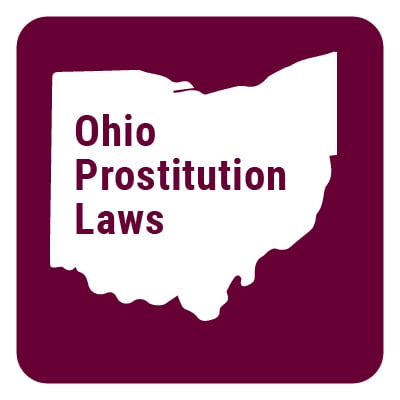Is prostitution legal in Ohio?
Prostitution is not legal in Ohio. Ohio Prostitution Laws already make sex work illegal, but problematic legislation is currently in committee that would increase punitive anti-prostitution measures. These new laws could increase stigmatization and discrimination.
State Guide: U.S. prostitution laws for all 50 states
Prostitution Laws of Ohio
- § 2907.21: Compelling prostitution
- § 2907.23: Procuring
- § 2907.24: Soliciting; after positive HIV test; driver's license suspension
- § 2907.241: Loitering to engage in solicitation; solicitation after positive HIV test
- § 2907.25: Prostitution; after positive HIV test
- § 2907.26: Rules of evidence in prostitution cases
- § 2907.27: Testing of accused for venereal diseases and HIV

§ 2907.21: Compelling prostitution
(A) No person shall knowingly do any of the following:
(1) Compel another to engage in sexual activity for hire;
(2) Induce, procure, encourage, solicit, request, or otherwise facilitate a minor to engage in sexual activity for hire, whether or not the offender knows the age of the minor;
(3) Pay or agree to pay a minor, either directly or through the minor's agent, so that the minor will engage in sexual activity, whether or not the offender knows the age of the minor;
(4) Pay a minor, either directly or through the minor's agent, for the minor having engaged in sexual activity, pursuant to a prior agreement, whether or not the offender knows the age of the minor;
(5) Allow a minor to engage in sexual activity for hire if the person allowing the child to engage in sexual activity for hire is the parent, guardian, custodian, person having custody or control, or person in loco parentis of the minor.
(B) Whoever violates this section is guilty of compelling prostitution. Except as otherwise provided in this division, compelling prostitution is a felony of the third degree. If the offender commits a violation of division (A)(1) of this section and the person compelled to engage in sexual activity for hire in violation of that division is less than sixteen years of age, compelling prostitution is a felony of the second degree.
§ 2907.23: Procuring
(A) No person, knowingly and for gain, shall do either of the following:
(1) Entice or solicit another to patronize a prostitute or brothel;
(2) Procure a prostitute for another to patronize, or take or direct another at his or her request to any place for the purpose of patronizing a prostitute.
(B) No person, having authority or responsibility over the use of premises, shall knowingly permit such premises to be used for the purpose of engaging in sexual activity for hire.
C) Whoever violates this section is guilty of procuring, a misdemeanor of the first degree.
§ 2907.24: Soliciting; after positive HIV test; driver's license suspension
(A) No person shall solicit another to engage with such other person in sexual activity for hire.
(B) No person, with knowledge that the person has tested positive as a carrier of a virus that causes acquired immunodeficiency syndrome, shall engage in conduct in violation of division (A) of this section.
(C) (1) Whoever violates division (A) of this section is guilty of soliciting, a misdemeanor of the third degree.
(2) Whoever violates division (B) of this section is guilty of engaging in solicitation after a positive HIV test. If the offender commits the violation prior to July 1, 1996, engaging in solicitation after a positive HIV test is a felony of the second degree. If the offender commits the violation on or after July 1, 1996, engaging in solicitation after a positive HIV test is a felony of the third degree.
(D) If a person is convicted of or pleads guilty to a violation of any provision of this section, an attempt to commit a violation of any provision of this section, or a violation of or an attempt to commit a violation of a municipal ordinance that is substantially equivalent to any provision of this section and if the person, in committing or attempting to commit the violation, was in, was on, or used a motor vehicle, the court, in addition to or independent of all other penalties imposed for the violation, shall impose upon the offender a class six suspension of the person's driver's license, commercial driver's license, temporary instruction permit, probationary license, or nonresident operating privilege from the range specified in division (A)(6) of section 4510.02 of the Revised Code.
§ 2907.241: Loitering to engage in solicitation; solicitation after positive HIV test
(A) No person, with purpose to solicit another to engage in sexual activity for hire and while in or near a public place, shall do any of the following:
(1) Beckon to, stop, or attempt to stop another;
(2) Engage or attempt to engage another in conversation;
(3) Stop or attempt to stop the operator of a vehicle or approach a stationary vehicle;
4) If the offender is the operator of or a passenger in a vehicle, stop, attempt to stop, beckon to, attempt to beckon to, or entice another to approach or enter the vehicle of which the offender is the operator or in which the offender is the passenger;
(5) Interfere with the free passage of another.
(B) No person, with knowledge that the person has tested positive as a carrier of a virus that causes acquired immunodeficiency syndrome, shall engage in conduct in violation of division (A) of this section.
(C) As used in this section:
(1) "Vehicle" has the same meaning as in section 4501.01 of the Revised Code.
(2) "Public place" means any of the following:
(a) A street, road, highway, thoroughfare, bikeway, walkway, sidewalk, bridge, alley, alleyway, plaza, park, driveway, parking lot, or transportation facility;
(b) A doorway or entrance way to a building that fronts on a place described in division (C)(2)(a) of this section;
(c) A place not described in division (C)(2)(a) or (b) of this section that is open to the public. (D) (1) Whoever violates division (A) of this section is guilty of loitering to engage in solicitation, a misdemeanor of the third degree.
(2) Whoever violates division (B) of this section is guilty of loitering to engage in solicitation after a positive HIV test. If the offender commits the violation prior to July 1, 1996, loitering to engage in solicitation after a positive HIV test is a felony of the fourth degree. If the offender commits the violation on or after July 1, 1996, loitering to engage in solicitation after a positive HIV test is a felony of the fifth degree.
§ 2907.25: Prostitution; after positive HIV test
(A) No person shall engage in sexual activity for hire.
(B) No person, with knowledge that the person has tested positive as a carrier of a virus that causes acquired immunodeficiency syndrome, shall engage in sexual activity for hire. (C) (1) Whoever violates division (A) of this section is guilty of prostitution, a misdemeanor of the third degree.
(2) Whoever violates division (B) of this section is guilty of engaging in prostitution after a positive HIV test. If the offender commits the violation prior to July 1, 1996, engaging in prostitution after a positive HIV test is a felony of the second degree. If the offender commits the violation on or after July 1, 1996, engaging in prostitution after a positive HIV test is a felony of the third degree.
§ 2907.26: Rules of evidence in prostitution cases
(A) In any case in which it is necessary to prove that a place is a brothel, evidence as to the reputation of such place and as to the reputation of the persons who inhabit or frequent it, is admissible on the question of whether such place is or is not a brothel.
(B) In any case in which it is necessary to prove that a person is a prostitute, evidence as to the reputation of such person is admissible on the question of whether such person is or is not a prostitute.
(C) In any prosecution for a violation of sections 2907.21 to 2907.25 of the Revised Code, proof of a prior conviction of the accused of any such offense or substantially equivalent offense is admissible in support of the charge.
(D) The prohibition contained in division (D) of section 2317.02 of the Revised Code against testimony by a husband or wife concerning communications between them does not apply, and the accused's spouse may testify concerning any such communication, in any of the following cases:
(1) When the husband or wife is charged with a violation of section 2907.21 of the Revised Code, and the spouse testifying was the victim of the offense;
(2) When the husband or wife is charged with a violation of section 2907.22 of the Revised Code, and the spouse testifying was the prostitute involved in the offense, or the person transported, induced, or procured by the offender to engage in sexual activity for hire;
(3) When the husband or wife is charged with a violation of section 2907.23 of the Revised Code, and the spouse testifying was the prostitute involved in the offense or the person who used the offender's premises to engage in sexual activity for hire;
(4) When the husband or wife is charged with a violation of section 2907.24 or 2907.25 of the Revised Code.
§ 2907.27: Testing of accused for venereal diseases and HIV
(A) (1) If a person is charged with a violation of section 2907.02, 2907.03, 2907.04, 2907.24, 2907.241, or 2907.25 of the Revised Code or with a violation of a municipal ordinance that is substantially equivalent to any of those sections, the arresting authorities or a court, upon the request of the prosecutor in the case or upon the request of the victim, shall cause the accused to submit to one or more appropriate tests to determine if the accused is suffering from a venereal disease.
(2) If the accused is found to be suffering from a venereal disease in an infectious stage, the accused shall be required to submit to medical treatment for that disease. The cost of the medical treatment shall be charged to and paid by the accused who undergoes the treatment. If the accused is indigent, the court shall order the accused to report to a facility operated by a city health district or a general health district for treatment. If the accused is convicted of or pleads guilty to the offense with which the accused is charged and is placed under a community control sanction, a condition of community control shall be that the offender submit to and faithfully follow a course of medical treatment for the venereal disease. If the offender does not seek the required medical treatment, the court may revoke the offender's community control and order the offender to undergo medical treatment during the period of the offender's incarceration and to pay the cost of that treatment.
(B) (1) (a) Notwithstanding the requirements for informed consent in section 3701.242 [3701.24.2] of the Revised Code, if a person is charged with a violation of division (B) of section 2903.11 or of section 2907.02, 2907.03, 2907.04, 2907.05, 2907.12, 2907.24, 2907.241, or 2907.25 of the Revised Code or with a violation of a municipal ordinance that is substantially equivalent to that division or any of those sections, the court, upon the request of the prosecutor in the case, upon the request of the victim, or upon the request of any other person whom the court reasonably believes had contact with the accused in circumstances related to the violation that could have resulted in the transmission to that person of a virus that causes acquired immunodeficiency syndrome, shall cause the accused to submit to one or more tests designated by the director of health under section 3701.241 of the Revised Code to determine if the accused is a carrier of a virus that causes acquired immunodeficiency syndrome. The court, upon the request of the prosecutor in the case, upon the request of the victim with the agreement of the prosecutor, or upon the request of any other person with the agreement of the prosecutor, may cause an accused who is charged with a violation of any other section of the Revised Code or with a violation of any other municipal ordinance to submit to one or more tests so designated by the director of health if the circumstances of the violation indicate probable cause to believe that the accused, if the accused is infected with the virus that causes acquired immunodeficiency syndrome, might have transmitted the virus to any of the following persons in committing the violation:
(i) In relation to a request made by the prosecuting attorney, to the victim or to any other person;
(ii) In relation to a request made by the victim, to the victim making the request;
(iii) In relation to a request made by any other person, to the person making the request.
(b) The results of a test performed under division (B)(1)(a) of this section shall be communicated in confidence to the court, and the court shall inform the accused of the result. The court shall inform the victim that the test was performed and that the victim has a right to receive the results on request. If the test was performed upon the request of a person other than the prosecutor in the case and other than the victim, the court shall inform the person who made the request that the test was performed and that the person has a right to receive the results upon request. Additionally, regardless of who made the request that was the basis of the test being performed, if the court reasonably believes that, in circumstances related to the violation, a person other than the victim had contact with the accused that could have resulted in the transmission of the virus to that person, the court may inform that person that the test was performed and that the person has a right to receive the results of the test on request. If the accused tests positive for a virus that causes acquired immunodeficiency syndrome, the test results shall be reported to the department of health in accordance with section 3701.24 of the Revised Code and to the sheriff, head of the state correctional institution, or other person in charge of any jail or prison in which the accused is incarcerated. If the accused tests positive for a virus that causes acquired immunodeficiency syndrome and the accused was charged with, and was convicted of or pleaded guilty to, a violation of section 2907.24, 2907.241, or 2907.25 of the Revised Code or a violation of a municipal ordinance that is substantially equivalent to any of those sections, the test results also shall be reported to the law enforcement agency that arrested the accused, and the law enforcement agency may use the test results as the basis for any future charge of a violation of division (B) of any of those sections or a violation of a municipal ordinance that is substantially equivalent to division (B) of any of those sections. No other disclosure of the test results or the fact that a test was performed shall be made, other than as evidence in a grand jury proceeding or as evidence in a judicial proceeding in accordance with the Rules of Evidence. If the test result is negative, and the charge has not been dismissed or if the accused has been convicted of the charge or a different offense arising out of the same circumstances as the offense charged, the court shall order that the test be repeated not earlier than three months nor later than six months after the original test.
(2) If an accused who is free on bond refuses to submit to a test ordered by the court pursuant to division (B)(1) of this section, the court may order that the accused's bond be revoked and that the accused be incarcerated until the test is performed. If an accused who is incarcerated refuses to submit to a test ordered by the court pursuant to division (B)(1) of this section, the court shall order the person in charge of the jail or prison in which the accused is incarcerated to take any action necessary to facilitate the performance of the test, including the forcible restraint of the accused for the purpose of drawing blood to be used in the test.
(3) A state agency, a political subdivision of the state, or an employee of a state agency or of a political subdivision of the state is immune from liability in a civil action to recover damages for injury, death, or loss to person or property allegedly caused by any act or omission in connection with the performance of the duties required under division (B)(2) of this section unless the acts or omissions are with malicious purpose, in bad faith, or in a wanton or reckless manner.
(C) As used in this section, "community control sanction" has the same meaning as in section 2929.01 of the Revised Code.





